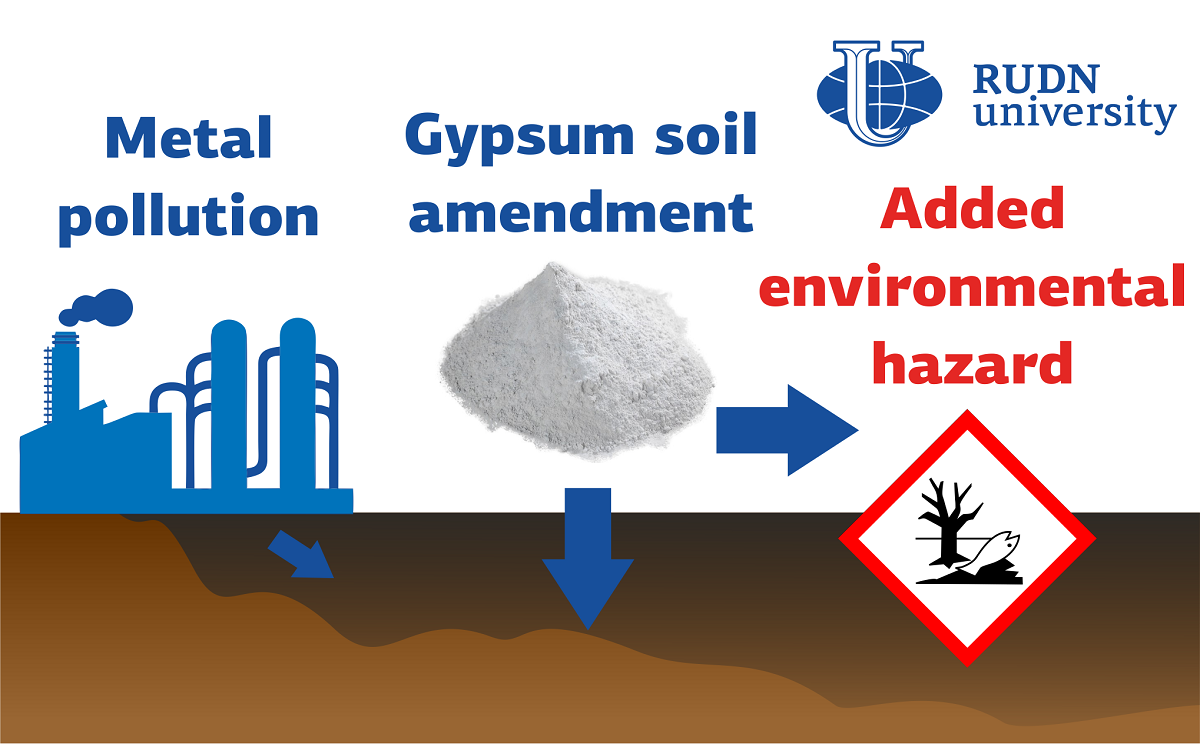RUDN ecologists: gypsum is ineffective for protecting soils from toxic metals
Cadmium, lead, zinc, copper and other toxic metals enter the environment with household waste and wastewater from factories. They easily form organic compounds and accumulate in living organisms. To reduce the negative impact of metals, scientists are trying to reduce its bioavailability. One of the most common ways is to add gypsum to the soil. RUDN agronomists have proved that this method is not only ineffective, but, on the contrary, increases pollution.
“Some studies suggest adding gypsum to reduce the phytotoxicity of metals. However, for real soils collected in the field, the evidence for the effectiveness of gypsum is limited. We were able to find only one study evaluating the effectiveness of gypsum additives for soil contaminated by mining activities. We also studied the effects of gypsum on plant growth in soils polluted by a copper smelter,” Tatiana Dubrovina, an employee of the Department of Landscape Design and Sustainable Ecosystems of the RUDN.
Agrotechnologists took soil samples in the taiga region near the town of Revda (Sverdlovsk region, Russia). In the late 1930s, the Sredneuralsky copper smelter was opened in the city — since then, sulfur dioxide and solid particles with copper, cadmium, lead, zinc and other toxic metals have been heating up in the studied region. RUDN researchers took samples of contaminated soil, dried, cleaned and measured the metal content. Then the samples were divided into two parts: some were treated with plaster, others were not. To simulate natural conditions, the soil was regularly moistened and then allowed to dry. Ecologists planted long-term chaff (Lolium perenne) in both soils. He was chosen for the experiment because he is sensitive to toxic metals. After 21 days, the grass was cut and its condition and the composition of the elements in it were studied.
It turned out that gypsum treatment worsened the growth of grass — up to 50% at high concentrations of metals. The concentration of toxic metal, at which the length and weight of the plant are halved, turned out to be approximately equal for gypsum-treated soil and “clean”. But the amount of metals in the grass grown on different soils differed significantly. On gypsum-treated soil, the chaff accumulates more harmful elements. For example, manganese in grass from “clean” soil turned out to be 11 times more than in a plant from gypsum-treated earth. And in the “gypsum” soil itself, manganese turned out to be 2 times more than in pure.
“Our study is the first attempt to recognize the problem of the danger of gypsum in the treatment of natural soils contaminated with metals. The addition of gypsum did not reduce the phytotoxicity of metals, i.e. plant growth in contaminated, gypsum-treated soils was reduced. Worse, the use of gypsum has led to increased absorption of metals by plants. Thus, gypsum is not only ineffective in reducing the phytotoxicity of metals, but also represents an inadequate practice of soil reclamation, since it increases the environmental hazard, and does not reduce it,” — Candidate of Biological Sciences Elvira Dovletyarova, Director of the Agrarian and Technological Institute of RUDN.
The results are published in the Chemosphere.
The RUDN Prize for Scientific Achievements in Chemistry for 2025, with a monetary award of 2 million rubles, was awarded to Alexander Davidovich Dilman, Deputy Director of the N.D. Zelinsky Institute of Organic Chemistry of the Russian Academy of Sciences. The researcher received the award during the celebration marking RUDN’s 66th anniversary.
Sergey Ivanov, a scholar from St. Petersburg, has been named the first winner of RUDN University’s International Prize for Scientific Achievements in Mathematics, worth 5 million rubles.
Products derived from microalgae represent a cutting-edge development in the field of bioeconomy. The potential of this biological resource was discussed at the international research seminar “Foundations for a Green Sustainable Energy”, part of the BRICS Network University’s thematic group on “Energy”. The event was organized by the Institute of Ecology at RUDN University.
